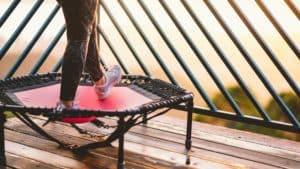
As a psychotherapist of 30 years, I’ve accumulated a toolbox of mood boosters and self-care skills that are tried and true. And they are coming in handy right now!
My general philosophy, both clinically, and in life, is that feeling good is a worthy goal. Being an adult is hard, especially these days. Across the board, my clients are telling me that they feel “blah” and “unmotivated.” We’re all looking for some relief from the stress of the world.
A New Way to Think About Exercise
I am a strong believer in healthy habits that feel good. I grimace at the expression “No pain, no gain.” As a specialist in eating and food issues, I see exercise as joyful movement – not a punishment for eating cookies. And practically speaking, pain isn’t exactly reinforcing.
If our so-called health habits are unpleasant, we’re less likely to want to continue them. We all have experiences of making New Year’s resolutions that require strict adherence to a restrictive diet or intense exercise program, and we know how well that goes.
You can’t shame yourself into health. There’s a better way.
Pleasure Is Health Promoting
Reminding ourselves that even a pleasant walk outside, without a FitBit, reaps many benefits. I call these “aesthetic walks” and I prescribe them to my clients with a history of punitive exercise routines that can become compulsive and out of tune with what our body is really needing.
Turns out, pleasure is health promoting. What a different way of approaching exercise!
Rebounding Has a Cult Following for a Reason
So what is rebounding and what is so special about it? Why is it so great for women our age? A rebounder is a mini-trampoline with a cult following because the list of benefits is truly impressive: it’s a low impact, but a highly efficient way to exercise your body.
For people who might be stiff and whose joints are achy, it is gentle and easy to do. It fits your fitness level; some rebounders favor cardiac routines, others bounce lightly without ever coming off of the mat. And it’s fun!
So Many Benefits
Rebounding improves immune function and cardio health, lymphatic drainage, and muscle tone. It increases metabolism and improves balance, which is very important as we age.
Lymph drainage is also important to those of us who have had mastectomies because scar tissue has likely affected your body’s ability to clear out toxins through your lymph system. It assists in clearing toxins from the body.
It Fits Well with Social Distancing
Rebounding helps us reduce our stress and tension, increase our circulation and helps keep the joints flexible. As a tennis player, I long suffered knee pain. I was wearing knee supports which helped a bit.
But regularly bouncing has really improved my pain and mobility. And it’s small enough that you can put it in your home without falling over it. Some models even fold up. Try that with a treadmill!
One of my clients puts it on her driveway and watches her kids in the backyard. She’s socially distancing, so it’s super handy to be able to jump while she’s watching the kids. Others put it on their deck. It’s so portable that you can rebound just about anywhere.
A Reliable Mood Booster
Bouncing softly is doable for people of all abilities. It’s also able to handle varying body weights. It’s an inclusive and friendly way to add joyful movement to your day. One that you will actually look forward to.
One of my favorite benefits of rebounding is that bouncing is a reliable mood booster. I challenge you to feel blue when you are bouncing to your favorite music.
I find it also increases energy when I’m feeling listless. Once I start, it’s easy to continue because it’s pleasant and easy to do. You can order a stability bar which is helpful for people with balance issues or those who feel less confident to start bouncing.
Go for Quality
My one caution is to invest in a solid unit. Check reviews and make sure you are getting one with a well-built frame and sturdy legs. Seniors should choose models with less bounce so they have more control and become less fatigued.
It’s a worthwhile investment in your physical and mental health. I’ve had mine for about 15 years, and it’s still going strong.
What do you know about rebounding? Have you tried it? What routines do you follow on your rebounder? Have you noticed how bouncing affects your mood? Please share with our community!





